Cerita 1
PEOPLE SKILL
I had an employee who kept making mistakes and was reaching to work late everyday. He was put on PIP but no improvement. His supervisor said she had tried everything.
PEOPLE SKILL
I had an employee who kept making mistakes and was reaching to work late everyday. He was put on PIP but no improvement. His supervisor said she had tried everything.
Instead of firing him, I sat down with him to TALK. It was obvious he was at a very low point. He had to move out his home and was going through a divorce, custody battle plus facing financial problems. He felt he was on the brink of a nervous breakdown. Asking for help wasn’t one of his strong points.
I recommended him for counseling andsent him on leave so he could get it together. When he returned, he went from being one of the most difficult employees to one of the most POSITIVE influences in the workplace.
Managers please use the HUMAN-to-HUMAN approach when dealing with employees. Take time to get to know your people, meet them where they are, and be flexible. It’s a person you are dealing with and not just a statistic on a graph. A little EMPATHY goes a long way.
My experience is that there are few bad employees but there are many “bad bosses” who lack PEOPLE SKILLS, and are quick to cross people off.
Cerita 2
I applied for an internal position. Aced the interview but still got rejected even though I was the top candidate. I later learned the person hired was a friend of my boss. I got tired of the office politics and started applying to other companies, and within 3 months I got a much better job. My old boss asked me to come back for the same promotion. I told him "thanks but no thanks."
Lessons learned:
1.You can be the best candidate and still not get selected.
2. If you didn't get the job, it was never meant for you.
3.You weren't rejected, you were redirected.
4. Your value does not decrease based upon someone's inability to see your worth.
5. Believe in yourself and keep trying, the right door will open for you.Cerita 2
5 Ways mentally strong people deal with Rejection
If there was one topic I would say I have the authority to discuss, it would be rejection.Throughout my journey, I’ve faced many ups and downs. At times the downs seems more than the ups, which can be overwhelming.
Often the people who you think “have it all” are people who have endured the most rejection. Not everyone who’s on top today got there with success after success. Their beginnings weren’t always smooth and they often had to face great obstacles and ridicule.
Rejection is one of the most brutal stakes to the heart because it deals a direct hit to the ego. There are few experiences more painful than being rejected. Dealing with rejection can be tough. A lot of people would chose physical pain rather than being rejected. Our basic human need to belong causes these incidents to stick with us throughout the years.
If you are charting a new path in a forested area expect rejection. Many of us have stifled our dreams by heeding some misguided critic who implied we were not good enough. Rejection is unavoidable in a creative life. Learning how to deal with rejection will keep you from plummeting into a place of immobilizing despair.
Overcoming Rejection
Keep in mind that you will probably never get rid of rejection; you may be rejected many times until the end of your life. Rejection on the whole is painful but viewing rejection as necessary and even positive will help you overcome it that much more easily.
- Have a vision and don’t let anything or anyone deter you from following it. Take Courage. Put full steam into the next best opportunity you are working on.
- Keep a positive mental attitude. Pick up the pieces and dust yourself off. Stay motivated. When one door closes,try another door. Keep trying sooner or later the right door will open.
- Don’t take it personally. Rejection is not a measure of your self–worth. When somebody rejects you, sometimes they are acting on their own insecurities and fears.
- Avoid over thinking the rejection. Don’t torture yourself repeatedly, reliving the moments of humiliation and thinking what you could have done to counteract it. If you keep picking at a scab, the wound would keep bleeding and you will never heal.
- Nothing happens before it’s time. Accept it was never meant for you at that point in time. When we get rejected we trap ourselves in a moment of doubt and distress. Don’t feel sorry for yourself and slump into an attitude of self-pity.
- Rejection offers us a chance to evolve through and learn from our experiences. Focus on professional and personal (spiritual, emotional, mental, physical) development. Life is not fair so develop thicker skin. Adversity may make or break you, but it certainly reveals you.
- Have Faith and Trust God to direct your steps – You weren’t rejected…You were divinely redirected. Things may look dismal, you may get disappointed but don’t be discouraged.When you look back you will say “Thank God!” that you didn’t settle for less. There was better in store.
- 5 Benefits of Rejection
1. It gets you fired up as it gives you something to prove – Harrison Ford: In his first film, Ford was told by the movie execs that he simply didn’t have what it takes to be a star. It added fire to the fuel as it gave him something to prove.
2. It makes you more creative – In 1919, Walt Disney was fired from the Kansas City Star. According to his editor, he “lacked imagination and had no good ideas.” You will find new ways to market yourself and your product.
3. It makes you work harder – Michael Jordan – “I think that not making the Varsity team drove me to really work at my game, and also taught me that if you set goals, and work hard to achieve them—the hard work can pay off.”
4. It develops your character – Your response to rejection shows how you respond when things don’t go my way. Are you able to let go or do you become resentful? You also will be more supportive to others facing similar struggles.
5. It builds strength – Today, Abraham Lincoln is remembered as one of the greatest leaders. However, rejection followed him in much of his early life. It did however better prepare him to handle ridicule in the public eye.
The Wisdom of Failure
Looking back, as we approach another year end and tabulating whether my successes have been more than my failures. It’s clear that failure has left its imprint.
The hardest blow came in the form of failing a major exam. The pain was crippling. It did knock me out for a bit. But after all, how do you climb back onto the saddle when the horse has flung you off: when your plans fall to pieces? Life will constantly test your resolve and level of commitment.
If only we could have patience in the midst of our trials. Coping with rejection and apparent failure is a serious matter. The tragic death of John Kennedy Toole (American novelist born in 1937) screams this truth. No publisher would touch Toole’s book. He began suffering from paranoia and depression. In a vain attempt to kill the pain, he committed suicide at the age of 31. Toole’s novels were rejected during his lifetime. However, posthumously, he won the Pulitzer Prize in 1980.

If you focus on positive thinking, even the harshest defeat is only a stepping-stone.
Never let Success get to your Head. Never let Failure get to your Heart. “I didn’t get consumed by losses,” said the legendary NFL coach Don Shula, “and I didn’t get overwhelmed by successes.”
Many of us have stifled our life by heeding some misguided critic who implied we were not good enough. Few things in life are certain but failure is.
Failure seems as something to be avoided at all cost. Although it leaves a sour taste, we should embrace failure for the learning opportunity it is. Failure is the oldest teacher, and perhaps the wisest of them all. Some things are impossible to completely grasp without first falling down.
We live in a culture that values perfectionism and failure is often viewed as a sign of weakness. People become so fixated on not failing that they never move forward. When it comes to failing, our egos are our own worst enemies. It’s easier to accept failure in private, but once the failure is obvious to everyone around you, it’s becomes harder to accept it. Holding onto failures for way too long is destructive.
The Importance of Failure
- It’s a learning Experience – Failure drives us to change. It represents opportunity and growth. It gives new direction. There is always one or more lessons to learn in what you may see as a failure.
- It builds Character – We learn how to behave when we finally accomplish our goals. The humility we gain through our failures allows us to better handle and appreciate success.
- It makes you Stronger – It’s with persistence we overcome failure to achieve success . When people fail, they feel unaccomplished, and so they try again and again, until they finally reach success.
- Your chances of Succeeding Increases – Failures are the pillars for success. You gain experiences you could not get any other way. Some things can only be learned through trial and error.
- Failure is a type of Freedom – Why? Because the worst has happened. Now, you can relax and rebuild again.
Success does not come easy. Everyone must face one hurdle after another. If you think that once you have the success you crave, you can relax, you are sadly mistaken.
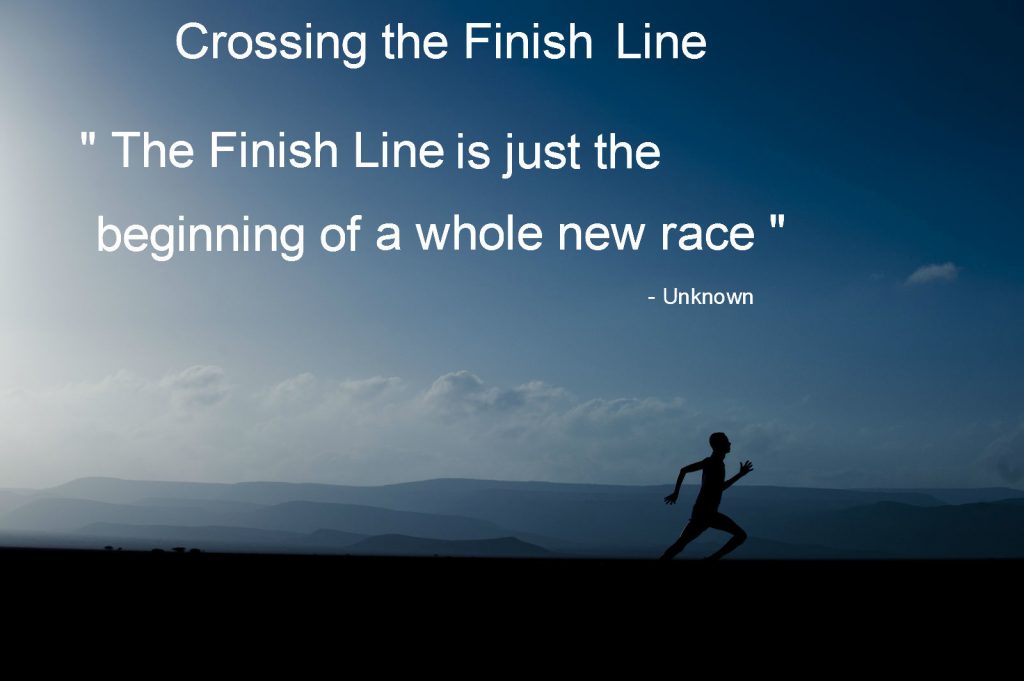
Failure can be costly, not only emotionally but financially as well. Some industries are very unforgiving as one or more failures may instantly get you the boot. The worse thing anyone can do, is not learn from failures.
In recent years, more and more executives have embraced the point of view, that failure is a prerequisite to invention. The fastest way to succeed,” IBM’s Thomas Watson, Sr., once said, “is to double your failure rate.” The growing acceptance of failure is changing the way companies approach innovation.
However, distinguishing between excusable and inexcusable failure is crucial. Managing failure is key. Some mistakes are unpardonable for example producing and marketing a dysfunctional product caused by poor quality control. Encouraging failure doesn’t mean abandoning or supervision or respect for sound practices. Managing for failure requires leaders to be more engaged, not less.
7 Powerful Quotes on failure:
1. “Failure is the tuition you pay for success.” ~Walter Brunell
2. “Success represents the 1% of your work which results from the 99% that is called failure.” ~Soichiro Honda
3. “Failure is the condiment that gives success its flavor.” ~Truman Capote
4. “There is no failure. Only feedback.” ~Robert Allen
5. “Remember that failure is an event, not a person.” ~Zig ziglar

6. “Failure is simply the opportunity to begin again, this time more intelligently.”~Henry Ford
7. “Never confuse a single defeat with a final defeat. “~F. Scott Fitzgerald
Finally, don’t let the fear of failure hold you back.
Remember to take risks: if you win, you will be happy; if you lose, you will be wise. Always find joy in your journey for as George Bailey said it best “It’s a Wonderful Life!
7 Deal-breaking behaviours that makes employees lose trust in their leaders.
- Taking credit for someone’s work.
- Blaming others and not standing up for your team.
- False promises to get someone to do something.
- Favoritism and being unfair.
- Downplaying employees' accomplishments to make oneself look better.
- Not appreciating loyalty, hard-work and efforts of others.
- Treating others poorly – not showing respect or empathy, micromanaging employees, not trusting them to do their job.
Talent will get you in the door but character will keep you in the room.
People don't leave bad jobs. They leave bad bosses. A lot of business leaders don’t even realize how closely they’re being watched by their subordinates. Your ability to influence is not just based on skill or intelligence; it’s based on trust and requires integrity, which is the foundation of real and lasting influence.
An employee's relationship with their manager sets the tone for their level of commitment to the organization's success. Threats and intimidation only yield temporary results. You can't keep throwing your employees under the bus and expect them to give their all.
If you aren't a person of integrity— your team won't trust you, vendors don’t believe you, and customers will not support your business.
People might tolerate a boring job or long commute, but they are more prone to leave if their boss treats them poorly. Many companies are struggling with low employee engagement. It all comes down to how you treat people. For loyalty, there has to be a relationship that develops between employee and employer and this develops over time through trust. Transparency, authenticity and walking the talk are essential for building trust. You can't buy loyalty, but you can certainly foster and nurture it by being a person of integrity.
If you aren't a person of integrity— your team won't trust you, vendors don’t believe you, and customers will not support your business.
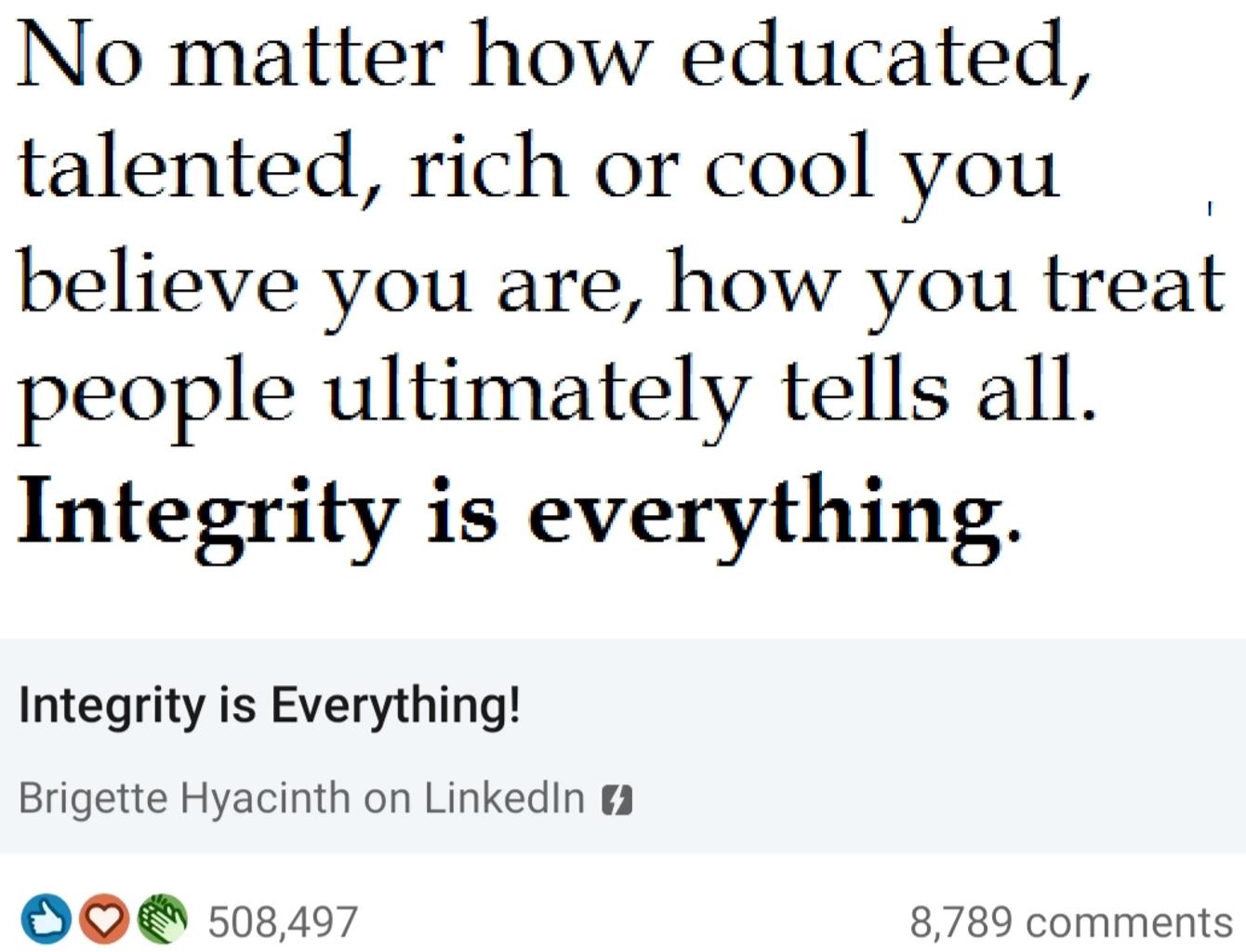
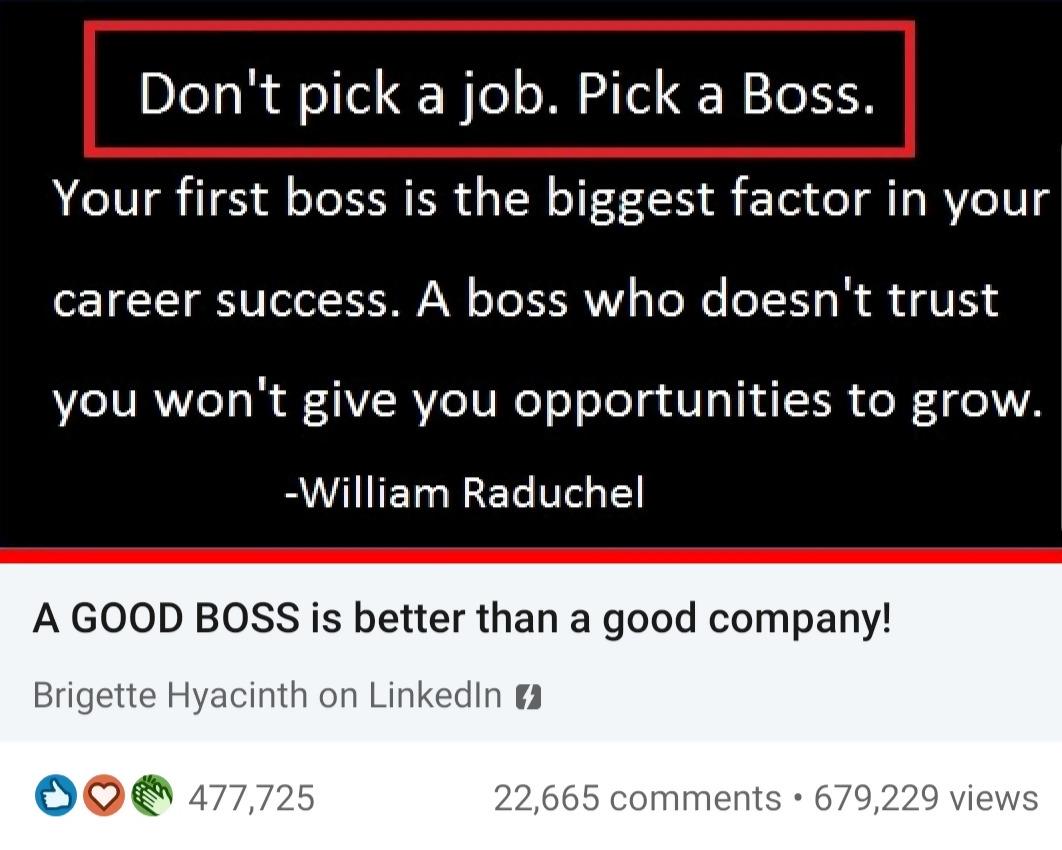
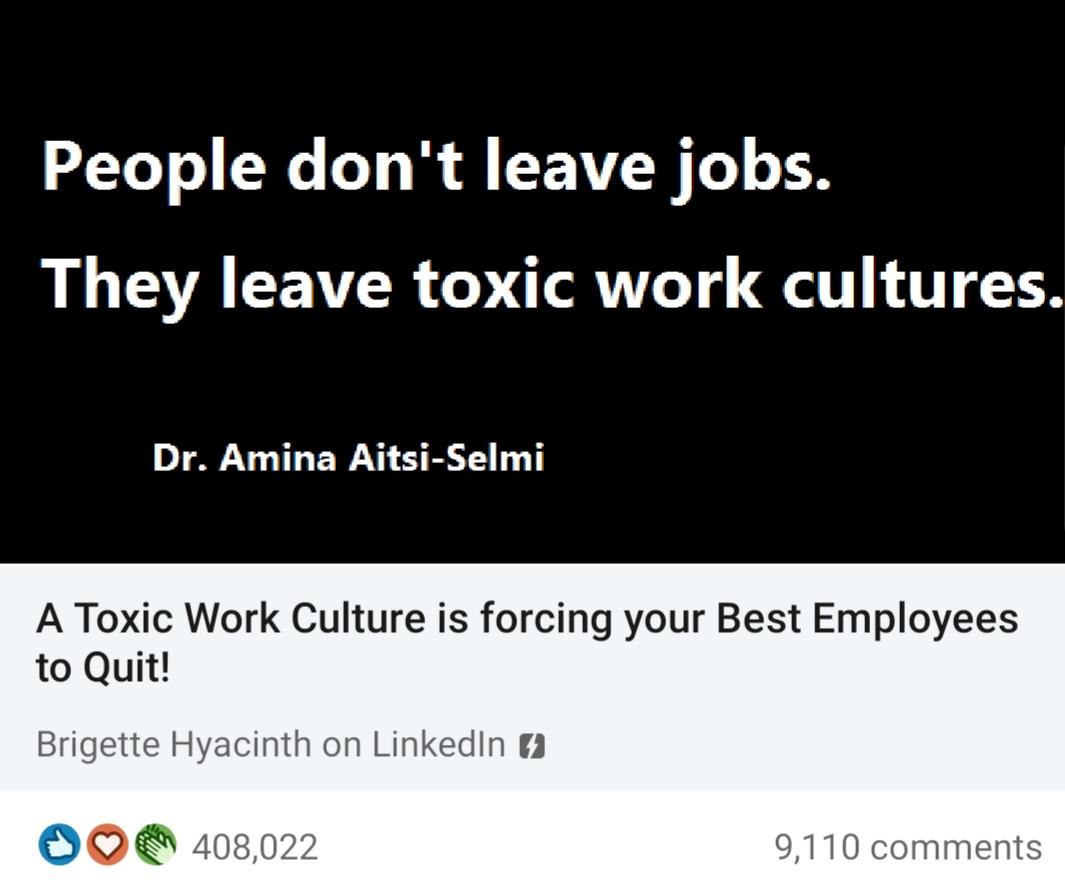
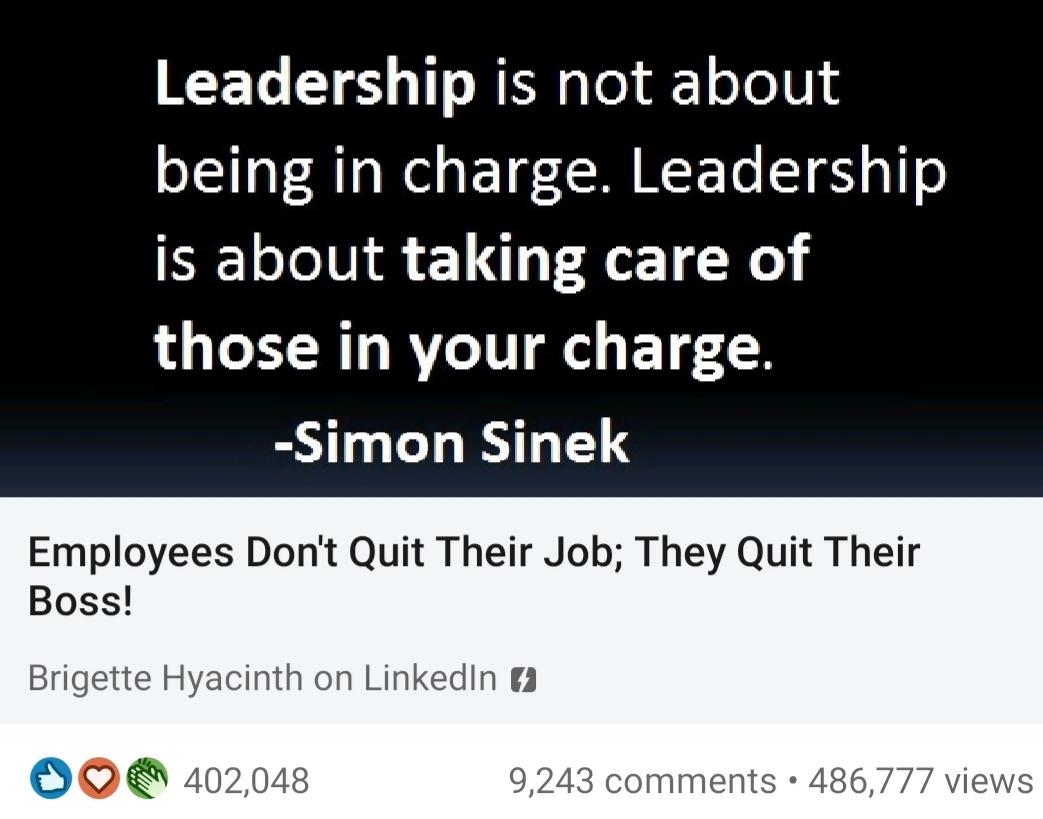
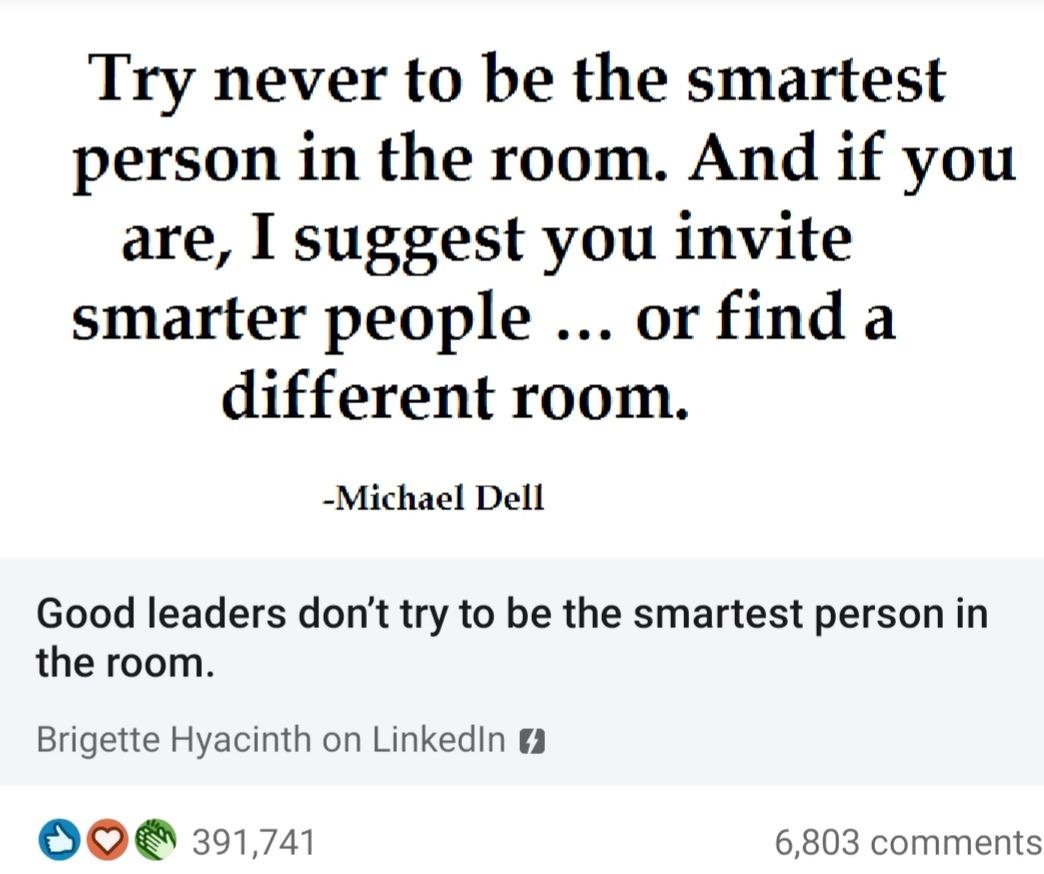
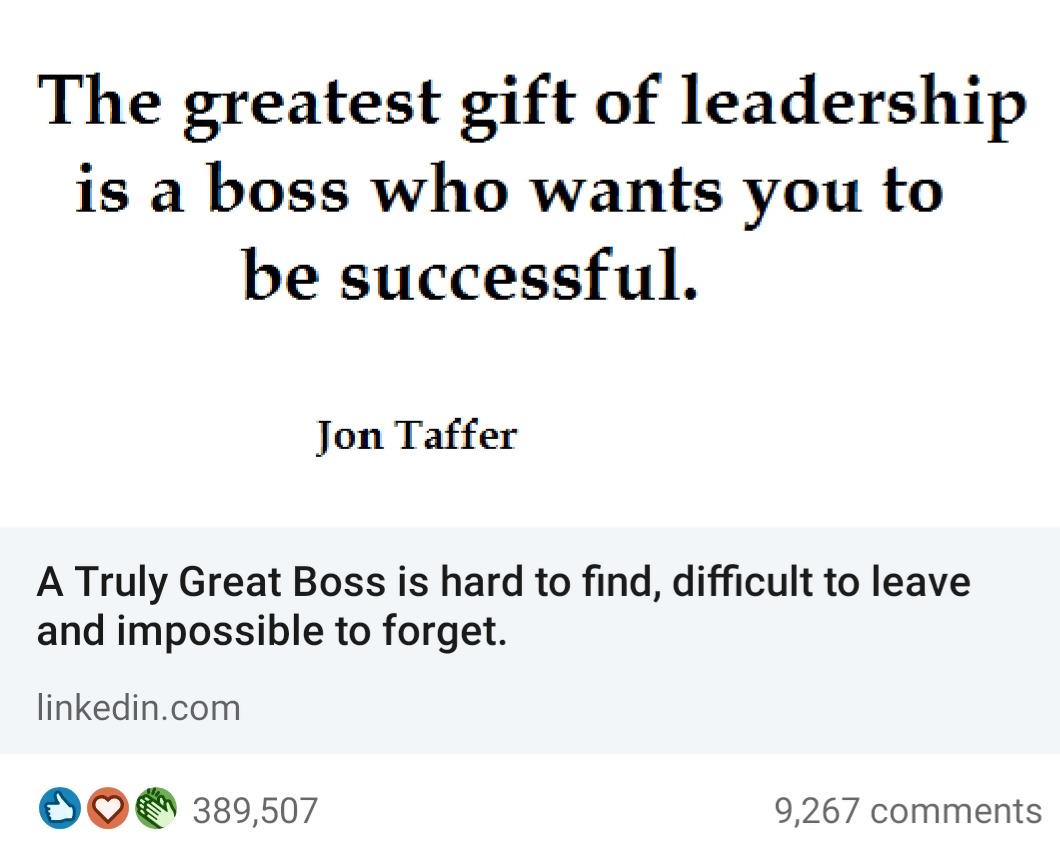
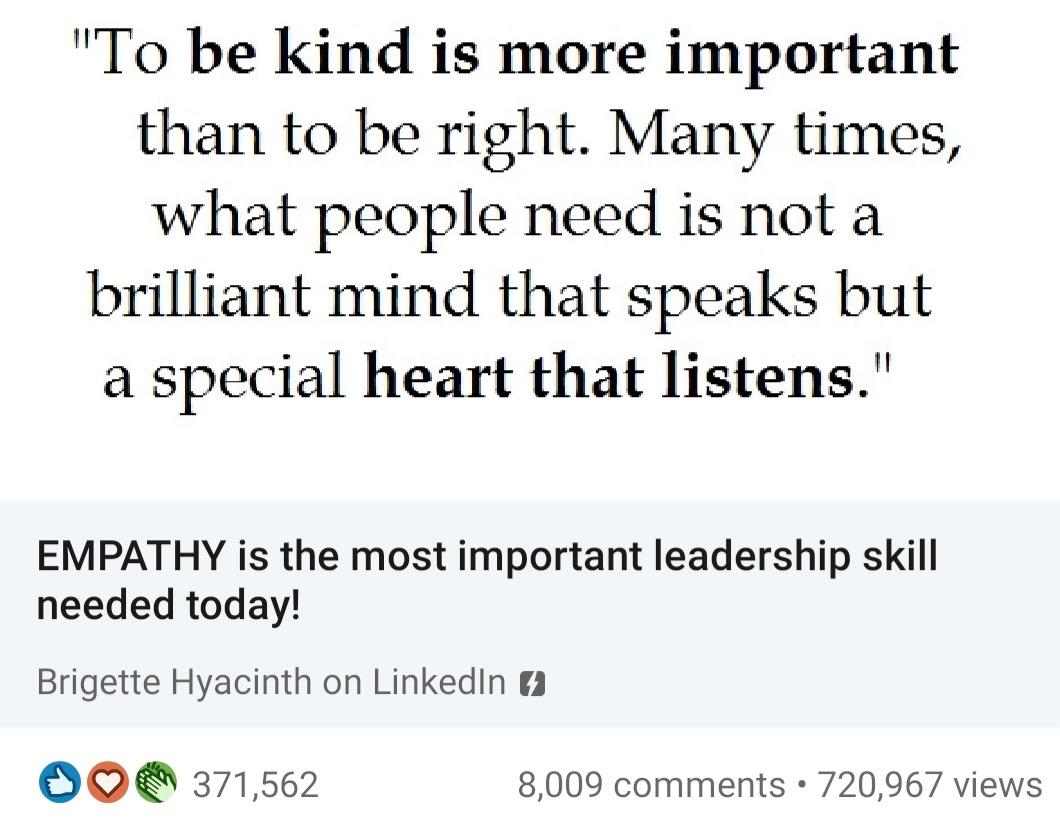

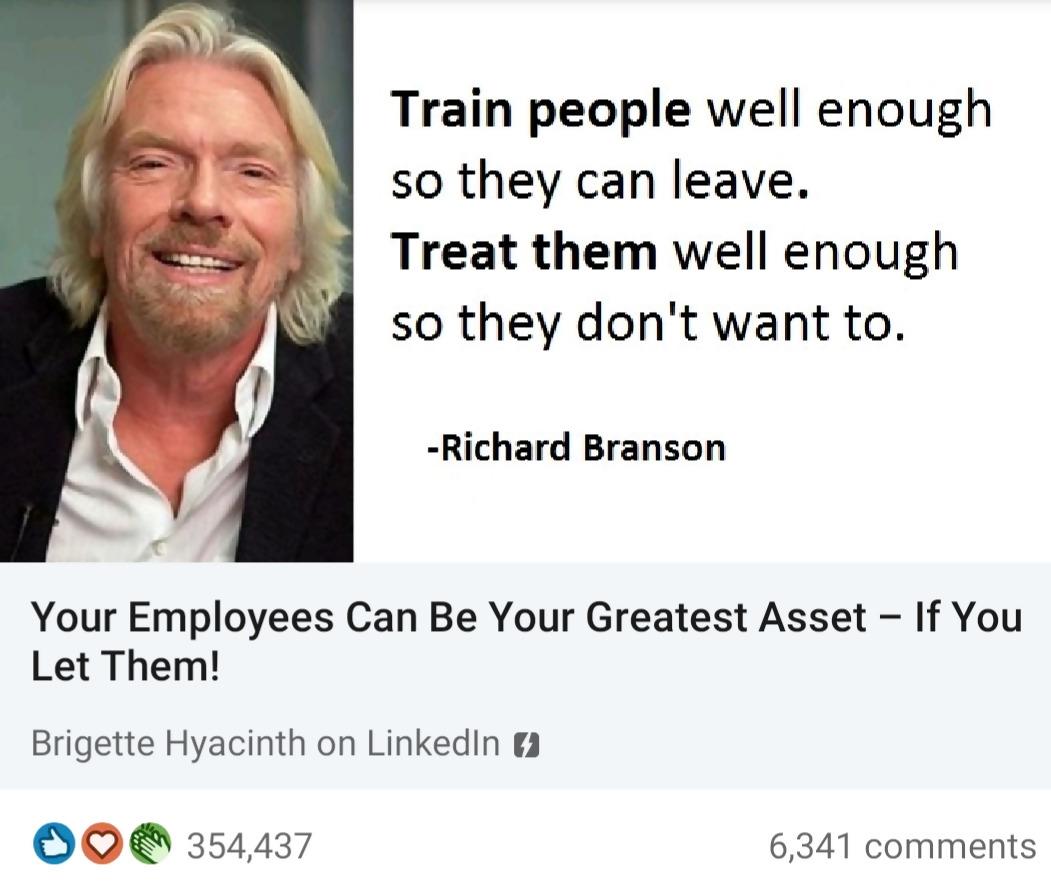
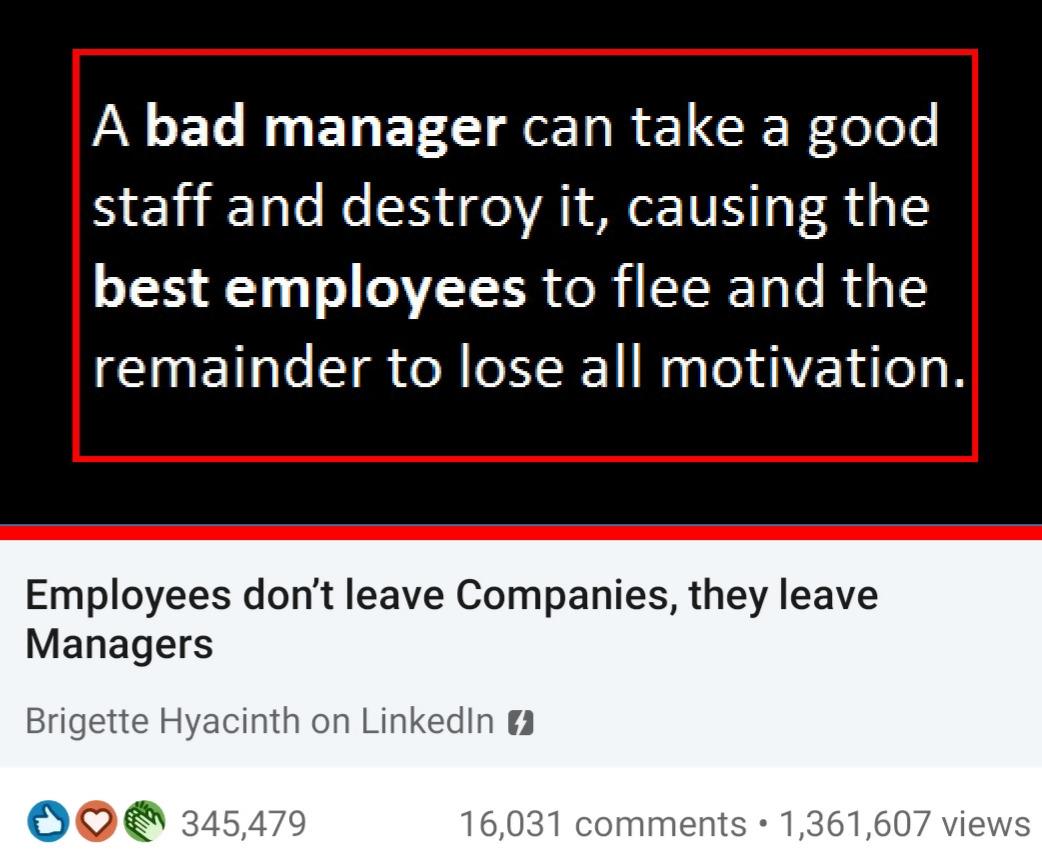




No comments:
Post a Comment